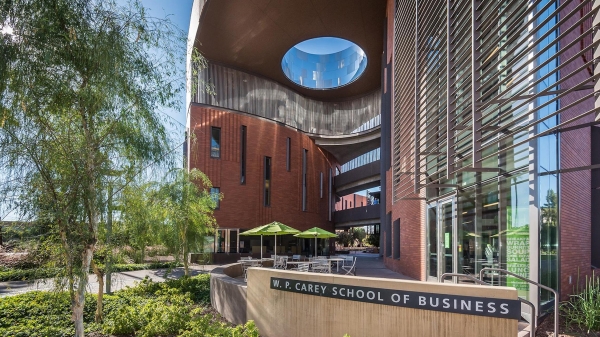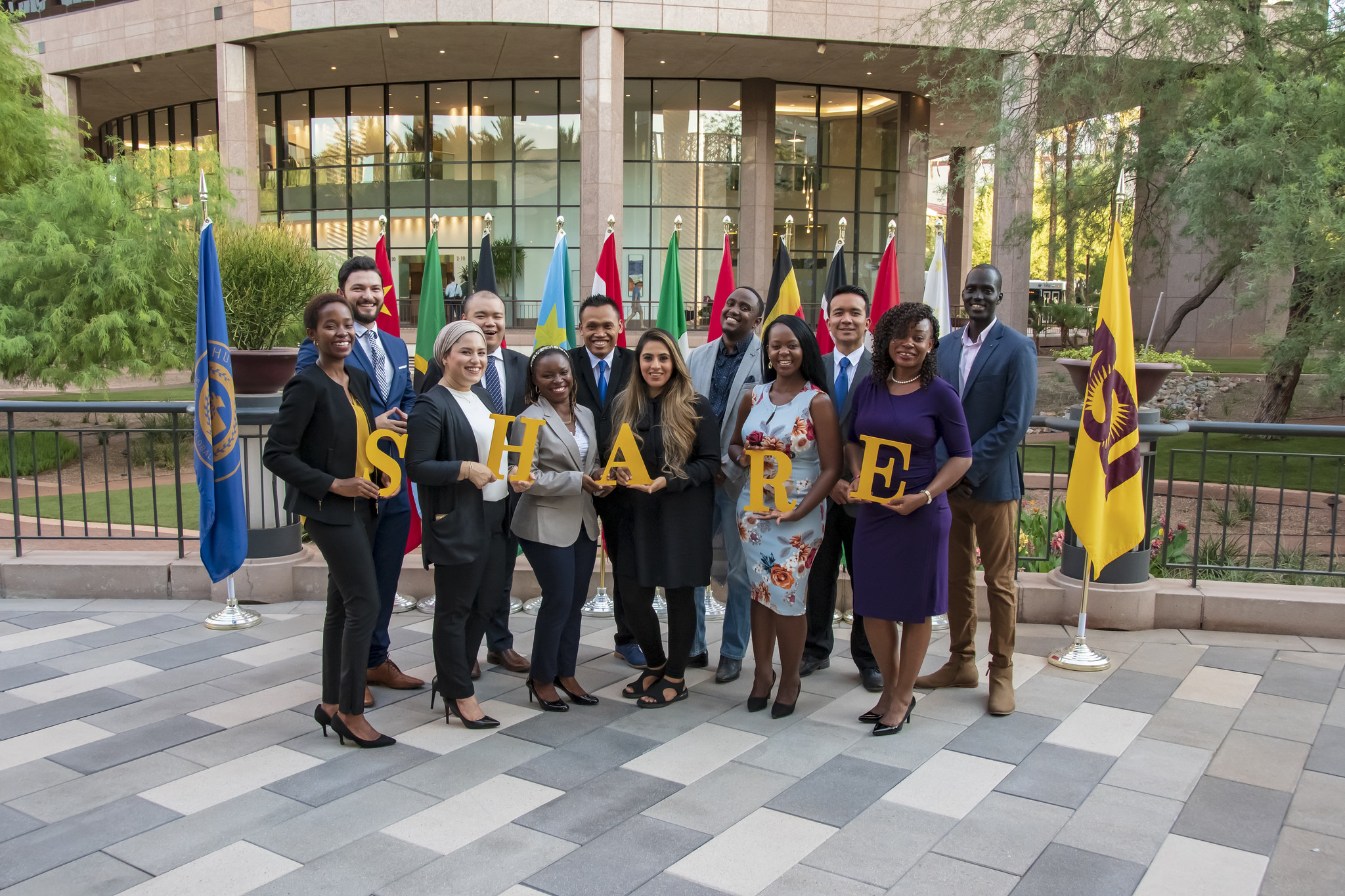Thunderbird provides culturally relevant mentorship for students from emerging countries

The Thunderbird School of Global Management is all about working across cultures, and after the school launched a generous scholarship program a decade ago, it has adapted the program to be more culturally competent.
Thunderbird is marking 10 years of SHARE Fellows, students from emerging countries who receive a full scholarship, expense money and mentoring. Over the past decade, 59 students from 29 emerging countries have received SHARE Fellowships to attend Thunderbird, which became part of Arizona State University four years ago. The fellows are encouraged to then give back to their communities.
“They end up being very active members of the campus because they don’t have those financial worries,” said Maria Houle, program director for the SHARE Fellowship.
“A lot of these students come from countries where you don’t give charity to people you don’t know, so many are surprised that alumni will give them money.”
The program was started in 2008 by Marshall Parke, who graduated from Thunderbird in 1977 and is now a partner and vice chairman of Lexington Partners investment firm.
“Marshall’s idea from his own experience at Thunderbird was that students from developing countries enriched the experience of everybody, and that they could make big changes in their own regions. But they needed mentorship,” Houle said.
Parke enlisted several alumni to raise money for the fellowship, with donors agreeing to be mentors to the fellows. But the mentorship piece didn’t take off, Houle said.
“These were high-end donors and we realized that with this population of students, many come from hierarchical cultures and they were uncomfortable calling them,” she said. “There wasn’t a formal procedure in place, and the students were very shy to initiate.”
Houle said that one student from Africa told her he couldn’t call someone he didn’t know.
“They did not have experience in calling strangers. That’s an American phenomenon,” Houle said.
So that’s where Houle comes in.
“Mentorship is a relationship that doesn’t have an end game, but we do have a goal: That the fellows have a job when they leave school,” she said.
“So we started setting career goals with the students, and I pull in people to be mentors as needed.”
The SHARE Fellows get coaching in how to overcome cultural barriers to networking. The fellows from 2018-19, from left: Irene Kinyanguli, Younis Altaie (Unis Taye), Hala Al Kasm, Han Zhang, Pauline Nalumansi, Yully Purwono, Yagana Hafed, Lemmy Gitahi, Annie Wambita Okanya, Rexcel Lagare, Mfon Vanessa Udo-Ema and Madit Yel.
Mentors can be Thunderbird alumni or people that Houle has known professionally.
“We have loads of seminars on how to network and how to call a stranger and what they can expect to get out of it,” she said.
“And I try to get their heads around the idea that if they call someone, it gives that person validation for their experience.”
Houle gives the fellows a lot of attention.
“If they want to run every email by me for cultural appropriateness, they can. Sometimes I’ll reach out on their behalf and I’ll get the ball rolling for them,” she said.
Nana Oureya, who is from Togo, was a SHARE Fellow last year and graduated from Thunderbird in 2017. She said that making networking calls was difficult at first.
‘I was shy. I said, ‘Maria, I can’t do it.’ But she said, ‘No, you’re giving something and you’re asking something and you can build these relationships,’ ” she said.
Oureya, a financial analyst at Intel in Chandler, said learning to network was crucial because she rotates among departments every 18 months.
“You have to be comfortable talking to senior people and know the politics and who to reach out to,” she said.
With the coaching, Oureya was able to land a summer internship position at Intel in October of her first year.
“I was so relieved, and it was because of everything that Maria taught us,” she said. “She taught us about our resume, how to dress, everything from head to toe.”
Houle said that many of the SHARE alumni have mentored other fellows.
“Mentors tend to be people who are more advanced in a career, but these students are looking for the entry point and the best ones to help are the ones who have just done it,” she said. “When you have a Vietnamese talking to a Kenyan, both have dealt with work authorization or issues with English.”
Mentoring is one way the SHARE alumni can give back — something the program encourages once they are settled in their careers. Some SHARE alumni support the community through their jobs, such as working in a nonprofit. Others have launched initiatives. Tenzing Paldon Nepali, a SHARE Fellow in 2014, co-founded Kalyani, a nonprofit to improve the health of women in rural Nepal. Stefan Dyulgerov of Bulgaria, a fellow in 2015, is a co-founder of the Society for Unity, which promotes education and civic values in southeastern Europe.
Rexcel Lagare is a current Thunderbird student and a SHARE Fellow who hopes to grow the economy in his native Philippines.
“My game plan now is to boost my skills portfolio to make me more qualified for advanced management positions, which in turn will raise my network and influence by being a successful business leader,” he said.
“That would provide that proverbial beacon of hope that will help eliminate poverty — currently the driving force in lawlessness and crime.”
Oureya is interested in helping girls in her native Togo aspire to higher education.
“You have to give back,” she said. “It’s like a chain, and that’s how you amplify the effect of what SHARE gives you.”
Top image from Pixabay
More Business and entrepreneurship

Arizona Business and Health Summit asks attendees to innovate for value
Arizona State University's W. P. Carey School of Business hosted the third annual Arizona Business and Health Summit, sponsored by the Arizona Biomedical Research Centre, on Thursday, Nov. 14, in…

An economic forecast with lots of variables
The prospect of a new presidential administration is prompting some discussions among top economists.Tariffs, immigration, possible deportation, tax cuts and reduced renewable energy credits are top…

ASU MBA ranked No. 1 in the US for entrepreneurship
In the Poets&Quants 2025 Best MBA Programs for Entrepreneurship ranking released today, the W. P. Carey School of Business at Arizona State University was named No. 1 in the U.S. and No. 2 in the…
